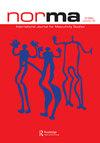他的身体,他的选择?父权制,对男性的歧视和战争中的保护性男子气概
IF 2.1
Q2 SOCIOLOGY
引用次数: 1
摘要
2022年3月,当我们NORMA的编辑们正在撰写第一篇关于俄罗斯对乌克兰战争背景下的男性和男子气概的社论时(Wojnicka,Mellström,&de Boise,2022),我们希望战争能迅速解决,我们不会被迫再写这篇文章。遗憾的是,这一希望尚未实现,因为战争仍在继续,看不到尽头。然而,自那以后,已经发表了几篇分析这场特定武装冲突性别方面的学术论文(Gaufman,2022;彭、怀克和张,2022;Shand,2022)。这是因为这种特殊情况再次说明了父权制的机制(Walby,1990),在父权制中,战争被用作再现性别不平等和等级制度的最终工具,在这种情况下,所有性别都受到不同形式的歧视。我们想继续为这次讨论做出贡献,这次的重点是男性、男性身体以及战争时期对他们的歧视。然而,由于主题的复杂性和社论的形式相当有限,我们将只关注我们认为需要在未来研究中进行更深入分析的突出问题。在批判男性和男性气质的学术中,认为父权制对所有性别都有不同但同样的伤害已经是老生常谈了(hooks,2004;詹登,2017;Scambor等人,2014)。这一点在武装冲突中尤为明显,在武装冲突期间,拥有“男性身体”的人(包括独联体男子和拥有阴茎的人)受到某些形式的基于性别的歧视,因为拥有一套特定的身体部位会使他们在战斗中有必要危及生命和健康。这一义务与其生理性别密切相关,因为妇女和被解读为女性的人不会被迫这样做,并且(通常)可以选择是否要战斗。当前乌克兰战争的例子很好地说明了这一机制。在俄罗斯军队入侵乌克兰几天后,乌克兰当局通过了一项法令,禁止几乎所有18-60岁的男性(除一些例外)到国外避难。与女性不同,无论她们的经历、计划、价值观或决定如何,她们都被迫留在这个国家,并随时准备作为士兵保护它。妇女和儿童理所当然地被允许寻求庇护。这些双重标准也适用于决定留在东道国的乌克兰移民男子,因为根据一些口头消息来源,他们被视为叛徒和懦夫,应该冒着生命危险回到乌克兰,只是因为他们是(并被视为)男子。然而,战时对男性的歧视并不局限于一个国家,例如俄罗斯也是如此。普京于2022年9月宣布的部分军事动员迫使数千名俄罗斯男子在身体上支持俄罗斯的侵略,无论他们对战争的态度如何,这意味着在实践中,他们被迫冒着生命和健康的风险,杀害他人。此外,拒绝参加战争并试图逃离俄罗斯的人通常甚至不被视为难民,因为许多国家拒绝将他们定义为难民,希望他们参与反对普京政权的斗争,而不是保护自己的生命。本文章由计算机程序翻译,如有差异,请以英文原文为准。
His body, his choice? Patriarchy, discrimination against men and protective masculinity at war
In March 2022, as we, the editors of NORMA, were working on the first editorial on men and masculinities in the context of the Russian war against Ukraine (Wojnicka, Mellström, & de Boise, 2022), we were hoping for a quick resolution to the war and that we would not be compelled to write about it ever again. Sadly, this hope has not yet materialized, as the war drags on with no end in sight. Since then, however, several scholarly papers analyzing the gendered aspects of this particular armed conflict have been published (Gaufman, 2022; Peng, Whyke, & Zhang, 2022; Shand, 2022). This is because this particular situation has illustrated, again, the mechanisms of patriarchy (Walby, 1990), whereby a war is used as the ultimate tool in enabling the reproduction of gender inequalities and hierarchies, where all genders are subjected to different forms of discrimination. We would like to continue to contribute to this discussion, this time focusing on men, male bodies, and discrimination against them in a time of war. However, due to both the complexity of the theme and the rather limited form of the editorial, we will focus only on signaling the salient issues that we believe will require more in-depth analysis in future studies. In critical men and masculinities scholarship it is already a platitude to state that patriarchy is differently but equally harmful to all genders, (hooks, 2004; Jenden, 2017; Scambor et al., 2014). This is particularly evident when it comes to armed conflicts, where people with ‘male bodies’ (both cis men and people with penises) are subjected to certain forms of gender-based discrimination, as having a particular set of body parts condemns them to the necessity of endangering their lives and health in combat. This obligation is strictly connected to their biological sex, as women and persons read as female are not forced to do so and (often) can choose whether they want to fight or not. The example of the current war in Ukraine illustrates this mechanism very well. Several days after the Russian army invaded the country, the Ukrainian authorities passed an ordinance under which almost all men 18–60 years old (with some exceptions) were forbidden to seek refuge abroad. Unlike women, they have been forced to stay in the country and be at the ready to protect it as solders, regardless of their experiences, plans, values or decisions. Women and children, rightfully, were allowed to seek refuge. These double standards have been also applied to migrant Ukrainian men who decided to stay in their host countries, as according to some oral sources they are seen as traitors and cowards who should go back to Ukraine at the risk of life and limb, only because they are (and are perceived as) men. However, discrimination against men in wartime is not limited to one country, as it happens, for instance, in Russia as well. The partial military mobilization announced by Putin in September 2022 obligated thousands of Russian men to physically support Russian aggression, regardless of their attitudes towards the war, which means, in practice, to be forced to risk their lives and health and to kill other people. Moreover, men who have refused to participate in the war and attempted to escape Russia are often not even considered refugees, as many countries refuse to define them as such, expecting them to engage in the fight against Putin’s regime instead of protecting their own lives.
求助全文
通过发布文献求助,成功后即可免费获取论文全文。
去求助
来源期刊

NORMA
Social Sciences-Gender Studies
CiteScore
3.00
自引率
14.30%
发文量
23
期刊介绍:
NORMA is an international journal for high quality research concerning masculinity in its many forms. This is an interdisciplinary journal concerning questions about the body, about social and textual practices, and about men and masculinities in social structures. We aim to advance theory and methods in this field. We hope to present new themes for critical studies of men and masculinities, and develop new approaches to ''intersections'' with race, sexuality, class and coloniality. We are eager to have conversations about the role of men and boys, and the place of masculinities, in achieving gender equality and social equality. The journal was begun in the Nordic region; we now strongly invite scholarly work from all parts of the world, as well as research about transnational relations and spaces. All submitted manuscripts are subject to initial appraisal by the Editors, and, if found suitable for further consideration, to peer review by independent, anonymous expert referees. All peer review is double blind and submission is online via Editorial Manager.
 求助内容:
求助内容: 应助结果提醒方式:
应助结果提醒方式:


